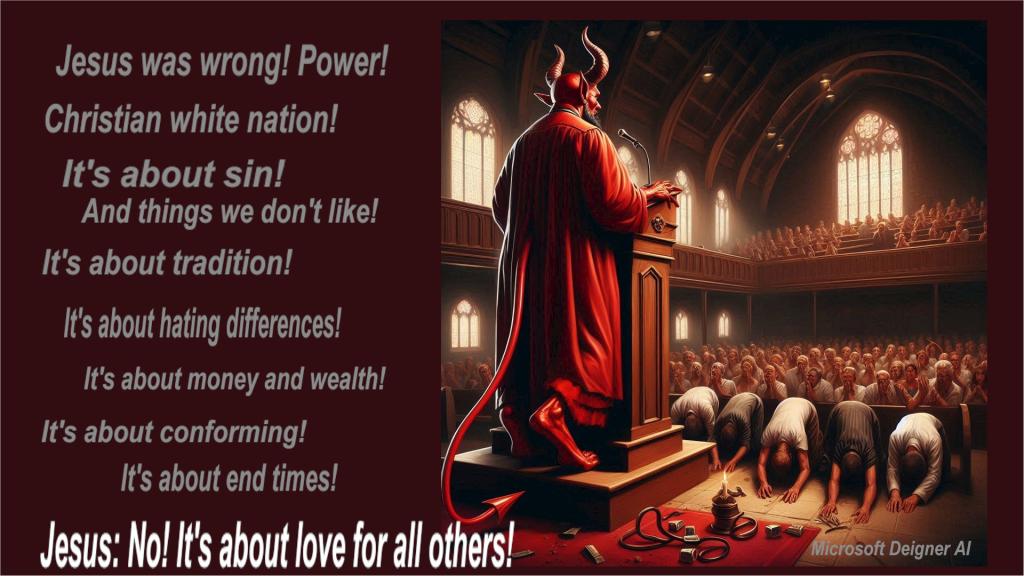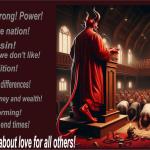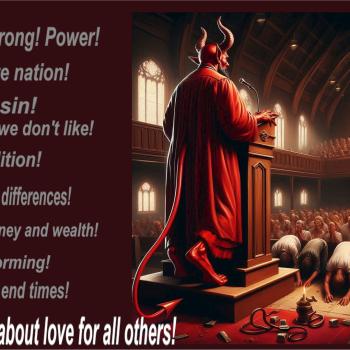The hijacking of Christianity. Part 5 of 6
A “zealot” is defined as someone fanatically pursuing religious, political, or other ideals, or a member of an ancient Jewish sect resisting Roman rule. They are unlike a mere fanatic who is intensely interested. A zealot more closely resembles an extremist holding extreme religious or political views, potentially advocating extreme action.
Today, some embody both: religious and political extremists who conflate the two and may advocate resistance to the point of violence. Unfortunately, their beliefs have to do with discrimination against others. Today’s churches have a crucial role to play in championing what is spiritual from being confused with bigoted beliefs. The spiritual is humane and just.
We’ve seen this show before.
Podcast show links with added content: Substack, YouTube video, Spotify, and Apple podcasts. These appear a day after blog-article posts.

The power of truth must be our weapon. Jesus himself spoke truth, and those who resonated with it followed him. Just as in his time, new generations today, Millenials, Z, and A, resonate with Jesus’s authentic truth and readily recognize the false and often harmful portrayals of Christianity that have emerged. It is this inherent truth that will ultimately prevail.
Ref. verses
“Will you steal, murder, commit adultery, swear falsely, make offerings to Baal, and go after other gods that you have not known, and then come and stand before me in this house, which is called by my name, and say, ‘We are delivered!’—only to go on doing all these abominations? Has this house, which is called by my name, become a den of robbers in your eyes? Behold, I myself have seen it, declares the Lord. ”
– Jeremiah 7:9-11 (ESV)
“if you do not oppress the sojourner, the fatherless, or the widow, or shed innocent blood in this place, and if you do not go after other gods to your own harm, then I will let you dwell in this place, in the land that I gave of old to your fathers forever.”
– Jeremiah 7:6,7 (ESV)
The hijacking of Christianity
As Jeremiah asks from God, has this house, which is called by my name, become a den of robbers in your eyes?
What picture do we paint of Christianity by allowing it to be ignored? There are over 1,200 Christian denominations in the U.S., as everyone paints a different picture of what it is. Under this Christian umbrella are racists, misogynists, nationalists, haters of foreigners, and violent extremists.
The image we paint in people’s minds, associating these things with the symbol of the cross and the church, is very powerful and lasting. It blasts people with an ugly story.
“Say it ain’t so.”
I don’t have a problem with different denominations emphasizing different things. People are not all the same, and different things resonate with them. My concern is when they go off the rails and become mired in the swamp of rotten purposes.
Hijacking by zealots: Christianity is about nation
The show we saw before was the mechanism used to put Jesus on the cross. Just as in Jesus’s time, zealots nationalized Judaism during the Maccabean period. They conflated the messianic verses of the king who released them from Babylon and allowed them to rebuild their Temple with the desire for self-rule in their time, 400 years later.
They wanted a political and religious kingdom. They did this while ignoring the Suffering Servant verses of the 400-year-later messiah (Christ) who was Jesus.
They picked and chose from their scripture and took it out of context, just as we often do today to support our own beliefs.
The bad results of zealotry
In Jesus’ day, Judas Iscariot, likely a zealot himself who badly wanted a military king like David, exemplifies the dangers of such an approach. Following Jesus’s death, this nationalist fervor intensified, leading to constant harassment of the Romans, which ultimately backfired.
In 68–70 CE and 128 CE, the Romans, weary of the unrest, decisively crushed the Jewish rebellion, destroying the Temple to rubble, as Jesus predicted, and killing or scattering the people of the nation of Israel to the wind, as Jesus predicted. Judaism managed to survive in exile, demonstrating that faith isn’t about national boundaries.
Similarly, today, many conflate the US with Christianity, declaring the US a “Christian nation,” whatever that means. At the extreme (white supremacists), they want not only a pure (white) race but all other religions gone. In contrast, most nations with national religions have either ceased to have them or accept all religions.
Religious freedom, as in the US, is sacrosanct (too important or valuable to be interfered with). This conflation of faith and nation echoes the zealotry of the past and carries similar risks.
Christianity in politics
Recently, the President addressed the National Prayer Breakfast in Washington, where he laid out multiple steps he planned to take to address what he described as attacks on religious liberty and on Christians in particular.
These steps included establishing a task force and a presidential commission to protect Christians from religious discrimination—a move that no doubt pleased some of his constituents who would force Christianity on everyone and believe they are being persecuted. Task force to ‘eradicate anti-Christian bias.
However, if Christianity can’t stand up to criticism, then it’s not truth; it’s a cult of false religion. Beyond that, this no doubt will be challenged in court. It’s unconstitutional in two ways.
One, it’s against freedom of speech. This is the same freedom some people use to speak against Muslims and other faiths, which is wrong but legal. The administration’s acceptance of The Proud Boys is a case in point. The Proud Boys are a right-wing extremist group whose members embrace misogynistic, anti-immigrant, Islamophobic, and anti-LGBTQ+ ideologies.
The second constitutional violation is that it’s against freedom of religion. Both of these freedoms are enshrined in the US Constitution. They’re sacrosanct.
Existing law prohibits discrimination, so no new law is needed. It’s an overreach and another hollow core announcement to please a base.
I suspect this also targets new generations who look at injustice that many Christians support, such as discrimination against races, ethnicities, religions, foreigners, and endless wars. They reject these things and won’t align themselves with any who do them. This executive action will most likely inflame them to react. They don’t stand down against injustice and violation of rights.
We’re mostly not zealots
The practical reality is that most mainline denominations don’t support any of these things like the Proud Boys and some religious groups do. They embrace other races, ethnicities, religions, foreigners, and necessary military actions needed for protection of the US and its allies.
Most importantly, Christianity is not political or national. As Jesus pointed out, it’s a spiritual kingdom, not a physical one, and he turned away from politics. The closest Christianity gets to physical is the people of the church who are Jesus’ body on earth.
Christianity is compatible with most governments. It asks that people love [charity] each other, and in a democracy, this can be reflected in the elected leaders who represent the people. This distinction between the spiritual and the temporal [relating to worldly as opposed to spiritual affairs] is crucial for understanding the true nature of Christianity.
What can churches do?
What does it mean to be a Christian? Does it mean to have animosity toward those of different faiths, of different ethnicities, races, foreigners, or sexual differences? Does it mean to worship democracy and capitalism?
Or does it mean to act as Jesus did? To reach out to others and guide them?
This is the crossroads churches today find themselves in. Many churches have gone after the zealot style religion, hoping to rule the US with misguided ideals. Many despise the idea of social justice for which Jesus and the prophets before him were famous. They are antichrist.
Newer generations will never accept this brand of Christianity. It’s been killing the church. The strength of the future of Christianity lies in new generations, who are activists who won’t take no for an answer. They create change. Their commitment to justice and equality offers a powerful counterpoint to those who don’t support social justice within the church.
Therefore, churches can stand strong about their beliefs, about their truth, about the truth taught by Jesus. Eventually, the truth will win out. Eventually the misguided churches will die out. This suggests a hopeful, though perhaps gradual, shift within the Christian landscape.
Ultimately, the path forward is clear. Stay true to the mission. Love God. God is love, which is charity and mercy to all. Bring people into the spiritual kingdom. Be kind to each other. This is the law and the prophets, and the new law of Jesus, and covers all human conduct. This message of love and inclusion should be the guiding principle for all Christian churches.
Conclusion
Christianity is not about politics, kingship leaders, zealotry, or freedom and democracy. It’s about how we treat each other. “And a second is like it: ‘You shall love your neighbor as yourself.’ On these two commandments hang all the Law and the Prophets.” – Matthew 22:39
Christianity is about acquainting people with the way to live, as demonstrated by Jesus, so they enter the “spiritual domain” [kingdom] of God that is here, now, and is spiritual not physical. It’s about love, which encompasses all human action and activity.
“Outrage (righteous wrath) can be good if it compels us to positive action but not to hate.”
– Dorian Scott Cole
“With hate, we have more to lose than gain – break the cycle” – Dorian Scott Cole
Probability Space
What probability spaces can we open in our minds to demonstrate the love of God and our own love of others, to help the world be a better place for all, so that people want to follow the Way Jesus showed us to live?
(A probability space is where all of the elements necessary for something to happen are present and it’s almost inevitable. All it takes is intention.)
Potential Space
If you think creatively and allow your mind to wander and explore, how can we change people’s perspective of Christianity in peaceful ways?
(A potential space is a virtual space in our minds where entirely new things can take shape.) More: Is Music A Form Of Prayer?
Would love to hear your thoughts in the comments below. This helps me improve my work.
Please subscribe to my Patheos Newsletter.
Some things that you might love
Would love to hear your thoughts in the comments below. This helps me improve my work.
Please subscribe to my Patheos Newsletter.
Below is information for creating change in my new book, Unleash Movements that Matter: Break Through Barriers to Change.
My new book. Unleash Movements that Matter: Break Through Barriers to Change.
My new book, Unleash Movements that Matter: Break Through Barriers to Change, which I wrote for new generations, I research and explain in great detail what it takes to create change in our world. (An audio presentation is in progress.)
Ministering to New Generations – strong impact course
How can churches minister to new generations if they won’t come to church? The church has been losing people at 1% a year, and now most of new generations won’t come.
I developed and presented a course on understanding and working with new generations. I would like to say I had rave reviews, but on a scale of 1 to 5 it averaged 4.5. Well, some people were raving.
The course helps people understand new generations, their values, and their differences. It helps people understand how to build a bridge to them and minister to them. The old worn-out things we used to do don’t work, and for good reason. This solutions focused course enables people to find new ways, appropriate ways, to minister to these generations in their local circumstances. It’s for church groups and generates deep discussion.
Free video preview of the course
Course on Udemy: Understanding and Working with New Generations
________________________
– Dorian
Our answer is God. God’s answer is us. Together we make the world better.
Restore and recreate. Take time to celebrate life. Laugh, sing, and dance regularly, even every day. Happy. This is why we dance to celebrate life: Reindeer actually running and dancing.
Building a Community of Action
New Way Forward community
Can we make positive change in our world and end a lot of suffering?
Helen Keller, who was both blind and deaf, said: “Although the world is full of suffering, it’s also full of the overcoming of it.”
The human spirit yearns for a world without suffering, but it’s through facing challenges that we progress. The world isn’t perfect, but together we can create a future with less hardship. Famine, discrimination, gun violence, and injurious economic and educational disparities are complex problems, yet understanding their root causes empowers us to find solutions.
Launching in first quarter 2025, the New Way Forward community will connect individuals seeking practical solutions and creating lasting change. We’ll focus on understanding problems and their solutions, and how to effectively create change.
Join us in building a brighter tomorrow! New Way Forward on Facebook.
Civic service opportunities
Do Unto Others Kindness Campaign, and civic engagement.
United Methodist Church Volunteer Opportunities.
Join or support Zero Hour and amplify the voices of youth organizing for climate action.
Peoples Hub. Resistance, Resilience, Restoration, Re-imagination. Online Popular Education. For movement workers to learn, connect, collaborate, and strategize – in and across the disability justice and solidarity economy movements.
Stakeholder Capitalism – a video podcast series from the World Economic Forum. Can capitalism be made to work for all of us – and to improve rather than destroy the state of the planet?
General service and aid opportunities (on One Spirit Resources Website). To add your service opportunity to the One Spirit Resources list, contact the author (me) through Facebook Messenger. Note that I only friend people I know.
————————————–
Education Opportunities for new generations
Becoming an Entrepreneur – MITx online
Evaluating Social Programs – MITx online
_______________________
Bible scripture verses are New American Standard Version (NASB), unless noted.
_______________________
Author and books
Appease the Volcano: What does God require from people? The voices of the ancients from many religions echo much of the same things: It starts with law, then mercy and forgiveness, then love. Love is a major emphasis in all major religions and replaces law.
The Prophetic Pattern: Ancient and Modern Prophecy: How to distinguish the intent of various types of prophecies and oracles, both ancient and modern.
Preparing For the Future Of Work and Education: Analysis of the kinds of jobs that AI and Robotics will displace, and the educational requirements for them. AI will replace or augment thirty percent of jobs. This is an in-depth analysis citing many authoritative sources.
Author Website: Dorian Scott Cole















